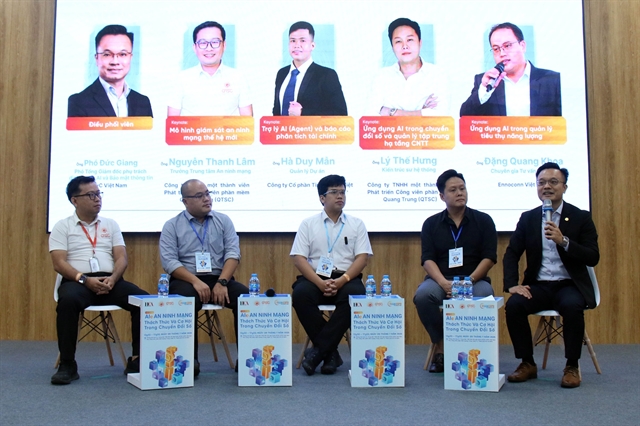AI and cybersecurity: a dual-edged force in Việt Nam’s digital transformation
As artificial intelligence (AI) becomes increasingly integrated into sectors such as healthcare, finance, transportation, education, and agriculture, concerns about cybersecurity threats are also on the rise, experts said at a seminar held last week in HCM City.

HCM CITY — As artificial intelligence (AI) becomes increasingly integrated into sectors such as healthcare, finance, transportation, education, and agriculture, concerns about cybersecurity threats are also on the rise, experts said at a seminar held last week in HCM City.
Experts underscored the dual impact of AI, offering both immense opportunities and significant risks, at the seminar called “AI and Cybersecurity – Challenges and Opportunities in Digital Transformation”, within the framework of the second International Technology Exhibition (iTECH EXPO 2025) last week.
The seminar was co-organised by Quang Trung Software City (QTSC), the HCM City Computer Association (HCA), and the HCM City Digital Transformation Consulting and Support Center (DXCenter), with the goal of creating an in-depth forum for dialogue among technology experts, enterprises, and policymakers.
Trần Hữu Dũng, director of QTSC and vice chairman of HCA, said AI is being widely applied in production, finance, healthcare, energy, and public administration, while cybersecurity threats are simultaneously growing in scope and sophistication.
“It not only opens up exceptional opportunities for innovation, but also presents major security challenges, as the technology itself is being exploited as a tool for modern cyberattacks,” he said.
According to cybersecurity experts, the strong wave of digital transformation in Việt Nam is putting mounting pressure on security infrastructure, human resources, and system monitoring capacity.
The shortage of smart management tools, automated response protocols, and large-scale data analytics capabilities is increasing cybersecurity risks, especially for key sectors such as finance, industry, and e-government.
“Digital transformation cannot be separated from security and operational optimisation. The application of AI not only helps businesses process data more intelligently but also allows them to proactively respond to increasingly sophisticated cybersecurity threats,” he said.
Rising threats demand proactive response
According to the Ministry of Science and Technology, by the end of 2024, Việt Nam had nearly 74,000 digital technology enterprises, an increase of 10.1 per cent compared to 2023, contributing approximately 11 per cent to the national GDP.
The widespread adoption of AI in management and operations highlights the deep integration of AI across all aspects of life.
A June 2025 report by cybersecurity company Fortinet revealed that automated scanning activity reached 36,000 requests per second, up nearly 17 per cent, with 42 per cent of these being credential-based attacks, resulting in the leakage of 1.7 billion credentials globally.
In Việt Nam, data from the National Cybersecurity Association showed that 659,000 cyberattacks were recorded in 2024, impacting around 46.15 per cent of government agencies and businesses.
The Department of Cybersecurity and High-Tech Crime Prevention (A05) under the Ministry of Public Security also reported more than 74,000 cyberattack warnings targeting critical units, including 83 advanced persistent threat (APT) campaigns.
Experts at the seminar warned that cyberattacks are becoming increasingly sophisticated and targeted, especially against critical infrastructure systems that store sensitive data.
Sectors such as telecommunications, energy, securities, and logistics are facing growing threats from ransomware attacks designed to encrypt data and extort victims.
The seminar also highlighted the importance of equipping organisations with both the technology and the expertise needed to detect, defend against, and recover from evolving cyber threats, making AI a crucial ally in Việt Nam’s digital transformation journey. — VNS





